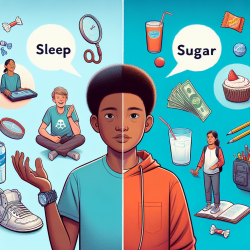Introduction
As practitioners in the field of speech-language pathology and online therapy services, understanding the broader socio-economic factors that influence our clients' lives is crucial. The research article titled Effects of Welfare Reform on Positive Health and Social Behaviors of Adolescents by Reichman et al. (2023) provides valuable insights into the impacts of welfare reform on adolescents' health and social behaviors. This blog aims to distill key findings from the study and suggest ways practitioners can integrate these insights into their practice.
Key Findings of the Research
The study examined the effects of welfare reform on various positive health and social behaviors among adolescents, such as eating habits, exercise, sleep, homework completion, and participation in community and school activities. Despite the reforms' intention to promote responsible behaviors through increased maternal employment, the research found no significant positive impact on these adolescent behaviors.
Interestingly, the study highlighted gender-specific differences, indicating that welfare reform had adverse effects on boys, who have been lagging behind girls in educational achievements. This underscores the need for targeted interventions that consider gender disparities.
Implications for Practitioners
As professionals dedicated to improving children's outcomes, these findings present both challenges and opportunities:
- Data-Driven Interventions: Utilize data to tailor interventions that address the specific needs of boys and girls differently, considering the socio-economic backgrounds that may influence their behaviors.
- Holistic Approach: Incorporate a holistic approach that considers the family’s socio-economic context. Understanding the potential stressors and constraints families face can guide more empathetic and effective interventions.
- Community Engagement: Encourage adolescents' participation in community and school activities, which are linked to positive outcomes. Facilitate access to such programs, especially for those from low-income families.
- Parental Involvement: Engage parents in the therapeutic process, emphasizing the role of modeling positive behaviors and creating supportive home environments.
Encouraging Further Research
The findings also highlight the need for further research into the long-term effects of welfare reform on adolescents. Practitioners are encouraged to stay informed about ongoing research and consider participating in studies that explore innovative interventions.
To read the original research paper, please follow this link: Effects of Welfare Reform on Positive Health and Social Behaviors of Adolescents.










